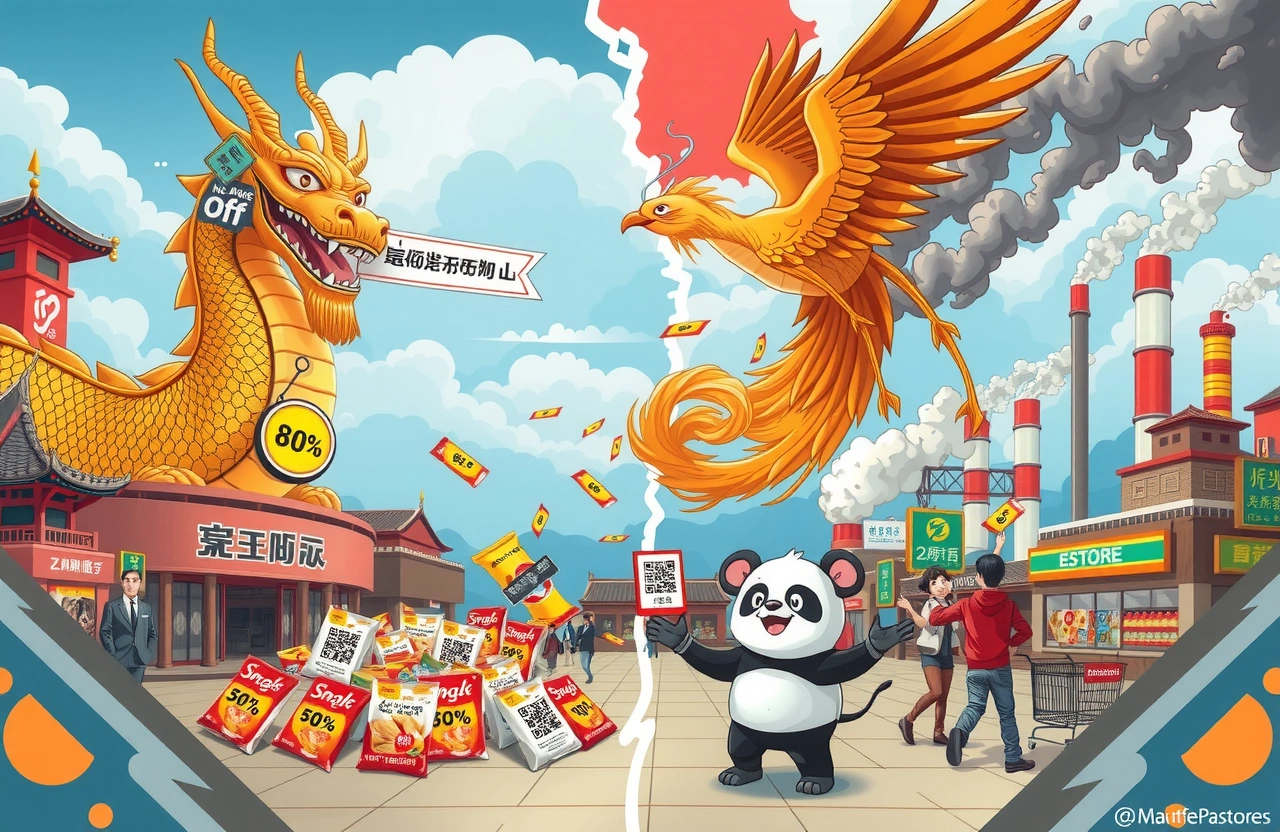The Industry Upheaval: Bestore’s Watershed Moment
China’s snack industry faces its most pivotal transformation since modern retail emerged. Bestore (良品铺子), once celebrated as the ‘premium snack pioneer’ with its 2020 IPO triggering 15 consecutive limit-up surges, now sells majority control for 5.5 billion yuan ($760 million). This bombshell deal signals profound market realignment as discount retailers rewrite industry rules. Since peaking above $4.7 billion valuation, Bestore lost over 80% market value despite premium branding—revealing fierce price wars where budget chains triumph. Industry experts warn this transaction confirms tectonic shifts already underway: consumer preferences favoring value over prestige, catastrophic profit erosion at established players, and fundamental disagreements about China’s snack consumption trajectory.
Bestore’s Financial Decline: From Market Leader to Crisis Mode
Bestore’s journey mirrors China’s consumer market volatility. After debuting as Shanghai’s darling, three consecutive years of deteriorating performance foreshadowed trouble:
Catastrophic Financial Metrics
- 2023 Results: 80.46 billion yuan revenue (-14.77% YoY), 1.80 billion yuan net profit (-46.27%)
- 2024 Acceleration: 71.59 billion yuan revenue, 461 million yuan net loss—first annual loss since listing
- 2025 Q1 Continuation: 17.32 billion yuan revenue (-29.34%), 40 million yuan operational loss (-173.21%)
Co-founder Yang Yinfen (杨银芬) confessed internally: ‘The challenge isn’t hardship—it’s survival itself.’ Founding CEO Yang Hongchun (杨红春) resumed control amid collapsing share prices, facing compounded pressure from his 53.72% pledged shares now underwater compared to original 19.49-24.22 yuan collateral pricing.
Investor Exodus Preceded Ownership Shift
Capital Flight Patterns
- Hillhouse Capital exited completely after holding 11.67% at IPO
- Today Capital (徐新) cut ownership from 30.3% to 18.16% through 15 separate divestments
- Controlling shareholder Ningbo Hanyi sold 58.43 million yuan ($8M) in June 2024 alone
The shareholder retreat reflects institutional skepticism about traditional premium models against discount disruption. Simultaneously, Ningbo Hanyi reduced holdings while founders reinstalled leadership—desperate maneuvers acknowledging systemic weaknesses.
Discount Retailers’ Disruptive Surge
Market Transformation Mechanics
- Price Differential: Identical packs sold at 50% discount versus Bestore
- Consumer Psychology: Young shoppers prioritize value when taste differentials diminish
- Supply Chain Advantage: Discount stores leverage 80% white-label suppliers versus Bestore’s premium-brand partnerships
Brands like Snack Very Busy (零食很忙) and Zhao Yiming (赵一鸣零食) fueled ‘paradigm collapse’ through community targeting strategies. China Commerce News observes Snack Very Busy operator Mingming Hen Mang (鸣鸣很忙) hitting $77 billion GMV with 14,000+ stores—primarily franchises achieving scale impossible for mall-anchored predecessors.
Strategic Missteps Aggravated Crisis
Bestore’s attempted pivot backfired spectacularly:
Failed Investment & Litigation
- February 2023: Invested $6.3 million in Zhao Yiming
- October 2023: Sold stake for $14.7 million amid disclosure concerns
- November 2023: Filed lawsuit alleging ‘deliberate concealment’ before Zhao Yiming’s merger with Snack Very Busy
While litigation continues, the merged entity ($77 billion GMV) prepares Hong Kong IPO—symbolizing discounters’ ascendancy as traditional players scramble.
Industry Economics: Unsustainable Margins?
Profitability Fragility
- Mingming Hen Mang: 2.1% margin
- Wanchen Group: 0.91% margin
- Consumer Loyalty Absent: 92% admit preference shifts based on instant promotions
‘Consumers chase novelty, not brands,’ explains Zhai Hongmei, snack industry analyst. The homogeneity traps both segments—especially when health-conscious trends complicate formulations without boosting allegiance.
Broader Industry Contraction
- Three Squirrels: Scaled back ‘10,000 Store Plan’ to actual 333 locations
- Laiyifen: Faced 16.28% store contraction (3,085 total)
All struggle against discount models exploiting China’s frugal consumption turn post-pandemic. Consumer confidence indexes show snack discretionary spending among lowest-ranked categories nationally.
The Path Forward: Consolidation Era
Expert Analysis
Pan Gongsheng (潘功胜), People’s Bank of China Governor: ‘Bargain-seeking reshapes retail nationwide.’ Guangdong Food Safety Association analyst Zhu Danping observes: ‘External factors caused 90% of Bestore’s decline; survival depends on recalibrating expectations.’
- Discount Chains IPO: Snack Very Busy and Three Squirrels preparing listings
- Supply Chain Focus: Winners will connect procurement directly to distribution
- Operational Efficiency: Eliminating layers becomes non-negotiable
Survival Imperatives in New Landscape
Bestore’s sale serves as industry inflection point—proving premium positioning untenable amidst stagnant incomes and discount proliferation. Whether new ownership can reinvent operations remains uncertain, but leadership changes won’t suffice. ‘This requires rebuilding enterprise DNA,’ declares Jiang Han, Pangu Institution researcher. Players must cultivate extreme supply-chain responsiveness, embrace private-label flexibility, and leverage consumer data at unparalleled granularity. For remaining contenders, adaptation speed determines survival now scale alone guarantees nothing.
The snack sector’s future belongs to those recognizing consumer calculus shifted permanently: taste and quality form mere entry tickets; victory demands delivering both while sustaining impossible price points. As capital floods discount IPO hopefuls, traditional champions must demonstrate sustainable unit economics quickly. Consumers won’t pay premium nostalgia premiums—and investors won’t fund transitions lacking disciplined execution.



